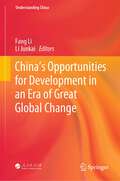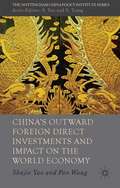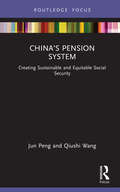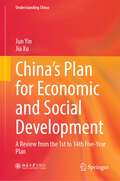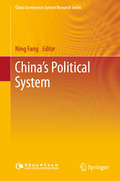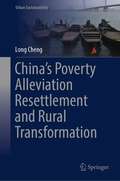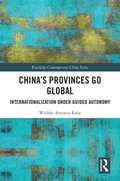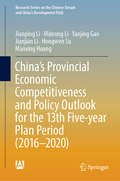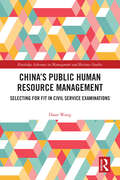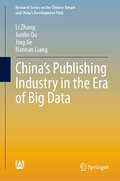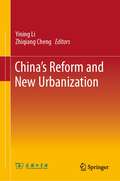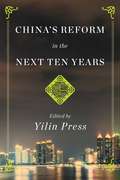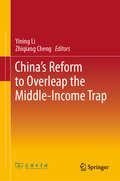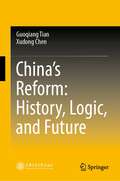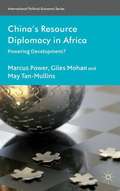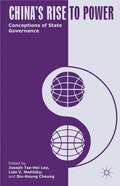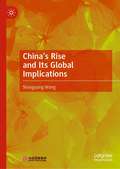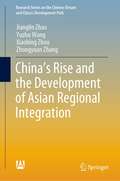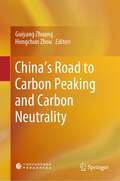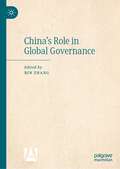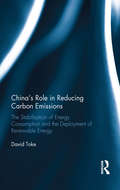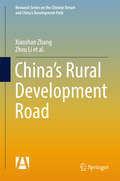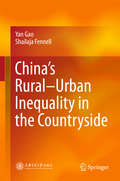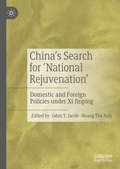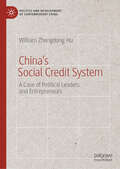- Table View
- List View
China’s Opportunities for Development in an Era of Great Global Change (Understanding China)
by Fang Li Li JunkaiThis book interprets China's development and the opportunities it can leverage in the context of unprecedented change and the COVID-19 pandemic. It aims to provide case studies and insights for researchers and offer authoritative information for those interested in China’s development. In this book, 20 distinguished experts and researchers contribute their wisdom around five topics: science and technology innovation, ecological environment, the global and Chinese economies, high-tech industry development, and international and Chinese media research.
China’s Outward Foreign Direct Investments And Impact On The World Economy
by Shujie Yao Pan WangThis book studies the impact of China's outward foreign direct investment on the world economy. It uses both case studies and modeling approaches to study how China's investments have affected the rest of the world.
China’s Pension System: Creating Sustainable and Equitable Social Security (Routledge Focus on Public Governance in Asia)
by Jun Peng Qiushi WangSince 1978, when China started remaking its economy, it has also embarked on an unparalleled effort at remaking its pension system to accommodate its hybrid economic model. This book tells the story of how China has managed to build a national pension system that now covers most of its population and what this system holds for its future.This book covers the following topics: evolution of Chinese pension system to its current form; benefit design, financing, and governance of current pension system; challenges facing the pension system, especially the looming funding shortage due to accelerating population ageing; solutions to the challenges; and lessons learned from the Chinese experience. Due to the fragmentation of pension system among 31 mainland provinces, we also select three provinces as case studies to help readers gain a richer understanding of how economic and geographic diversity has created disparity in pension benefit design and financing between provinces and within a province and how such disparity adds complexity and challenges to the pension system.This timely and important study provides up-to-date and in-depth analyses for policymakers and stakeholders to make informed decisions and will be relevant for all scholars and students of public administration and public policy studies.
China’s Plan for Economic and Social Development: A Review from the 1st to 14th Five-Year Plan (Understanding China)
by Jun Yin Jia XuThis book reviews the basic process of China’s fourteen five-year plans with systematic theoretical overview and rich historical data and moves on to discuss the theoretical logic of plan-based state governance. The authors hold that the five-year planning system with Chinese characteristics is a flexible planning system; through adaptive macro-planning and incentive target governance, it mobilizes government, market and social forces to work together to fulfill national objectives and is a representative mechanism of the state governance system and a symbol of modernized state governance capacity. From an academic point of view, it theoretically answers questions about what, why and how concerning the five-year plans. From an interdisciplinary perspective, it explores the theoretical logic and experience of plan-based governance by combining Marxism, western theories, and the science of history. Also, it tries to represent historical facts based on a vast literature about the history of CPC and PRC, reviews historical details of the previous thirteen five-year plans, and describes the great journey of the plan preparation and implementation under the CPC leadership. This book has been published in Simplified Chinese (Peking University Press) and Traditional Chinese (Hong Kong Open Page Press). It has won the 2021 Annual Books of China Economics Education and Research Network, the first prize of excellent Works of the First Young Marxism Prize, 100 "Red Classic Reading" recommended reading books of Jiangsu National Reading Activity Leading Group celebrating the Centennial of the Founding of the Party, and Jintai Good Books of People's Daily Library.
China’s Political System (China Governance System Research Series)
by Ning FangThis book includes collective research by the Institute of Political Science of the Chinese Academy of Social Sciences, which is an important research institution of political science and a think-tank in China. The book was completed by the expert team of "China's Political System" headed by Director Fang Ning for several years and after several changes in their manuscripts.This book covers the core political systems of China, such as the leadership system of the Communist Party of China, the decision-making system of the Party and government in Chinese politics, the system of the people's congress, the relationship between the central and local authorities, the system of officials training and selection, the system of discipline inspection and supervision, the system of consultative democracy and the system of community-level self-governance, etc.This book aims to build a new paradigm of empirical research and introduction of the contemporary Chinese political system by using the description and research method of materialization and dynamics of the political system.
China’s Poverty Alleviation Resettlement and Rural Transformation (Urban Sustainability)
by Long ChengThis book aims to offer a comprehensive understanding of China’s Poverty Alleviation resettlement (PAR) particularly under the Link Policy, and further analysing the impacts of PAR on China’s rural transformation from multiple scales (regional and individual) and perspectives (social-economic development, urban-rural interactions and landscape changes), with a combination of multiple approaches including systematic literature review, content analysis, econometrical methods, spatial analysis, Cellular Automata modelling etc. Policy suggestions will also be provided to improve farmers’ sustainable livelihood and resilience coping with the changes of lifestyles due to the resettlement. This book contributes to inspiring and provoking thought among policymakers, researchers, and individuals worldwide grappling with the pressing issue of poverty and its eradication. Understanding the Chinese experience may yield valuable insights that can be adapted and applied in diverse contexts around the globe.
China’s Provinces Go Global: Internationalization Under Guided Autonomy (Routledge Contemporary China Series)
by Wiebke Antonia RabeThis book provides novel insights into how Chinese provinces have developed into major sources of China’s outbound investments. Focusing on the Yangtze River Delta region, the book compares two provinces with highest outbound investment in China, Jiangsu and Zhejiang and traces how locality-unique conditions contribute to the economic internationalization of Chinese provinces. Through its in-depth exploration of these case studies, the book reveals how the deficiency of enterprises’ investment capacity heavily depends on the unique political, economic, formal and informal institutions of each province. The findings presented in this book also offer conclusions relevant to the study of the internationalization process of emerging economies engaging in outward investment, such as India and Brazil. Featuring insights from interviews with scholars, managers and government officials this will be an invaluable resource for scholars, students and professionals interested in International Economics, International Political Economy, Chinese Studies and Asian Studies.
China’s Provincial Economic Competitiveness and Policy Outlook for the 13th Five-year Plan Period (Research Series on the Chinese Dream and China’s Development Path)
by Jianping Li Minrong Li Maoxing Huang Yanjing Gao Jianjian Li Hongwen SuThis book focuses on the competitive situation and policy outlook of China’s provincial economy in the 13th five-year period. It begins with a general evaluation report on the country’s provincial comprehensive Economic Competitiveness, followed by analyses at the international, national and regional levels, industrial and enterprise levels. On the basis of domestic and international research findings, it further enriches our understanding of provincial competitiveness, analyzes the domestic and international situation, explores new changes, new norms, new situations and new challenges concerning China’s provincial economy in the past few years, reveals the characteristics and relative differences of different types, defines their internal competitive strengths and weaknesses, and provides valuable theoretical content to guide decision-making.
China’s Public Human Resource Management: Selecting for Fit in Civil Service Examinations (Routledge Advances in Management and Business Studies)
by Daan WangHow do governments select the right people for public service? This book examines the evolving logic of civil service recruitment in contemporary China, focusing on the balance between fairness, competence, and political loyalty. Through a detailed case study of Shenzhen, it offers rare insights into the workings of a highly standardized selection system.Spanning policy, practice, and perception, the book explores how China’s civil service examinations function in practice and whether they effectively match candidates with job and organizational requirements. Drawing on interviews with policymakers, examiners, and test designers, as well as a large-scale survey of civil servants, the study introduces a new theoretical concept—person–government fit—to explain hiring practices in state bureaucracies. It traces the historical development of the system, analyzes test content, and evaluates the outcomes of civil service selection using both qualitative and quantitative methods. Shenzhen, one of China’s most innovative and reform-oriented cities, serves as a revealing case to explore broader governance trends in the post-reform era. The book also offers a comparative perspective of the civil service examination in Hong Kong, providing practical lessons and policy improvements.This book will be valuable for scholars, students, and practitioners in public administration, political science, and Chinese studies. It offers a grounded, empirical look at how state capacity is built from the ground up and provides new tools for understanding recruitment and human resource management in the public sector.
China’s Publishing Industry in the Era of Big Data (Research Series on the Chinese Dream and China’s Development Path)
by Li Zhang Junlin Qu Jing Jie Nannan LiangThis book introduces China’s current publishing industry in the new era, especially when facing the big challenge from social media and technology transformation. Based on the calculation for the first time, the book and overall size of the content data of publications in China, the book presents 15 cases of Chinese publishers looking for opportunities to develop business, using the technology of big data and Internet. For global readers, it may help to build an overview on China's publishing industry and business innovation cases of media companies.
China’s Reform and New Urbanization
by Yining Li Zhiqiang ChengThis book presents a study of China's new urbanization, which is one of the country’s major economic issues and embodies the characteristics of its economic development. Professor Yining Li proposed the framework and wrote the first article. Under Li's guidance, other articles were written by researchers at the Guanghua School of Management, Peking University. In the central government development plan, urbanization is the main force stimulating domestic demand. And after more than 10 years of high-speed urbanization process, the change from simple urbanization to "the new urbanization" is an inevitable development direction. This book covers many crucial urbanization topics that directly affect China's reform.
China’s Reform in the Next Ten Years
by Yilin PressA collection of essays by leading Chinese political economists about the economic challenges facing China today and the reforms--to everything from financial institutions to urban housing policy--that will be necessary to prepare for the next ten years.
China’s Reform to Overleap the Middle-Income Trap
by Yining Li Zhiqiang ChengThis book addresses how China could avoid the middle-income trap. Professor Li Yining proposed the framework and wrote the first article. Under Li’s guidance, other articles were written by researchers at the Guanghua School of Management, Peking University. It is well known that China's reform has been highly successful, but there are still many unsolved institutional problems. The book’s authors suggest that the middle-income trap is composed of three traps. Firstly, there is the “development system trap”. Secondly, the “social crisis trap ” and finally, the “technology trap”. In order to avoid these traps, it is important for China to intensify its economic reform, to lessen the gap between the rich and poor, and to enhance innovations in technology as well as the capital market.This book uses both theoretical and case studies to discuss agricultural modernization, new urbanization, the urban-rural gap, income growth, community management, pastoral areas of medicine and the newly-industrializing economy, etc.
China’s Reform: History, Logic, and Future
by Xudong Chen Guoqiang TianThis book is about where to go and what to do in China’s reform. Its comprehensive overview and economic analysis of China’s reform offers a coverage not found in other English language text. It provides an overview of China’s development and reform practice, an economic analysis of China’s market-oriented reform and a brief introduction to the theoretical origin, practices, and defects of the planned economy. In so doing, this book demonstrates that the key to the success of China’s reform lies in drawing reasonable governance boundaries between government and the market and between government and society. It further discusses the basic elements required for modernizing China’s state governance system and conducts an analysis of China’s reform and development in 13 key fields. The analysis is based on three dimensions—theoretical logic, practical knowledge, and a historical perspective. This book proposes three elements of comprehensive state governance—inclusive economic institutions; the state capacity to plan and implement policies and laws; and an inclusive and transparent civil society with democracy, the rule of law, fairness, and justice. Its analysis also features the novel application of mechanism design theory by employing the two core ideas of information and incentives and a new research methodology consisting of “three dimensions and six natures”. This book reviews and grasps China’s reform through a qualitative analysis of economic theories and an empirical analysis of statistics from a historical perspective spanning over 180 years. It is proposed to be an important reference for understanding the past, present, and future of China’s reform and teaching about the potential economic superpower. It can also serve as an essential resource for those who are interested in China's economic reform and development.
China’s Resource Diplomacy in Africa
by Marcus Power Giles Mohan May Tan-MullinsThe book seeks to understand China's evolving political and economic role in Africa and assesses what impacts Chinese aid, trade and investment have on the politics of specific African countries, and the extent to which it excites geopolitical competition.
China’s Rise To Power
by Joseph Tse-Hei Lee Lida V. Nedilsky Siu-Keung CheungChina's combination of authoritarian rule and a market-oriented economy has proven simultaneously appealing and a source of domestic discontent. This essay collection balances policy analysis with detailed investigation of escalating popular unrest to anticipate the future of Chinese governance & society.
China’s Rise and Its Global Implications
by Shaoguang WangThis book is the culmination of a lifetime of research into Chinese development, situated in a global historical context. The author explores the irreplaceable role of state capacity, state-owned-enterprises and five-year plan in China’s transformation from an agricultural state to an industrial state and then to the world's economic powerhouse, as well as the remarkable achievements of social policy to reduce the rural-urban gap and regional gap. This book will be of interest to China scholars, development economists, political activists, and general readers who would like to know more about China's growth miracle.
China’s Rise and the Development of Asian Regional Integration (Research Series on the Chinese Dream and China’s Development Path)
by Jianglin Zhao Yuzhu Wang Xiaobing Zhou Zhongyuan ZhangThis book focuses on the market issues facing Asian industrialization and the possibility, feasibility, and sustainability of China integrating the Asian economics. How China's rise affects Asian market and the economic relation between China and other Asian economies? The book looks into this issue from market and regional perspectives and concludes that: Asian industrialization including China makes the unified regional market as the common goal of Asian economies; the integration of Asian markets is also a key strategy for China in the next 5-10 years; China may become a major player or even a leader in integrating regional markets; however, it will be a longtime process depending on China's economic strength in the future.
China’s Road to Carbon Peaking and Carbon Neutrality
by Guiyang Zhuang Hongchun ZhouThis book explains China's approach to emission peak and carbon neutrality. It provides knowledge related to emission peak and carbon neutrality in terms of the concept and connotations, practice path, energy basis, investment demand, technological innovation, consumption revolution, comprehensive response, carbon pricing mechanism, city leadership, goal synergy, role of carbon sinks, and global cooperation and gives answers to questions such as the profound significance of emission peak and carbon neutrality, China’s strategic considerations for setting the dual carbon goals, how should China achieve the dual carbon goals, and what far-reaching impact will the dual carbon campaign have on China and the world. It discusses the wide-ranging content in an easy-to-understand way. This book is a reference for global readers to learn about green and low-carbon development in China.
China’s Role in Global Governance
by Bin ZhangThis book presents a post-COVID glimpse at how top Chinese policymakers and intellectuals understand China's future in global international relations, reviewing the global economy, China’s economy, society and diplomacy, and the international situation. Ten researchers review China’s diplomacy and give their outlooks in the book. Topics discussed include: the new round of technological revolution and Industrial Revolution, the role of WTO in developing countries, the ups and downs of the Sino-US and Sino-American rivalry, the functioning of the UN General Assembly from a Chinese perspective, China’s role in restoring the world after COVID-19 pandemic, and the Beijing-led Belt and Road Initiative. This book will be of interest to development economists, scholars of politics and international relations, and scholars of comparative politics.
China’s Role in Reducing Carbon Emissions: The Stabilisation of Energy Consumption and the Deployment of Renewable Energy
by David TokeChina, a still developing economy comprising a fifth of the world’s population, will play a key role in the global movement towards reducing carbon emissions. The aims of the Paris Agreement may stand or fall with China, both for its own contribution and the example it will set the developing world. China’s Role in Reducing Carbon Emissions discusses the prospects for China achieving radical reductions in carbon emissions, within the context of the current economic and political landscape. With a particular focus on technologies such as such as wind power, solar power and electric vehicles, Toke examines how China is transitioning to a state of stable energy consumption via a service-based economy and heavy investment in non-fossil energy sources. The book concludes that China may be set to reduce its carbon emissions by approximately two-thirds by 2050. This book is a valuable resource for students and scholars of climate change, sustainable development, political science and energy, as well as energy professionals seeking to understand the implications of recent developments in China.
China’s Rural Development Road (Research Series on the Chinese Dream and China’s Development Path)
by Zhou Li Xiaoshan ZhangThis book systematically reviews the experiences and problems encountered in the development of China's rural areas over the past three decades since the start of the country's economic reform. As such, it addresses the most important aspects in terms of China's rural communities, farmers and agriculture from the perspective of development, such as the agricultural management system, rural land tenure system, rural fiscal and taxation system, financial system, science and technology system, rural governance structure, poverty alleviation, environmental protection, etc. The approach employed combines essential theories, laws, and policy strategies with rural development practice in order to analyze the success stories and lingering problems, to explore the causes of both, and to offer an outlook on the future of rural development.
China’s Rural–Urban Inequality in the Countryside
by Shailaja Fennell Yan GaoThis book approaches the issue of rural-urban inequality through fieldwork conducted in a specific township (Zuogang) in Qinggang County, part of Heilongjiang Province in northeastern China. Presenting painstaking fieldwork in a single location, it successfully illuminates fundamental aspects of the reality and the complexity of rural-urban inequality that cannot be found in macro-level studies, most of which are prepared by economists. The book offers a unique combination of rigorous economic analysis with insightful social and anthropological analysis, as well as revealing interviews with local government officials. This approach provides a rich tapestry of rural perceptions of rural-urban inequality. With in-depth analysis and empirical evidence on questions concerning the development and root causes of urban-rural disparities, the book significantly enriches our understanding of the widely discussed issue of rural-urban income inequality, but from the unique perspective of rural China.
China’s Search for ‘National Rejuvenation’: Domestic and Foreign Policies under Xi Jinping
by Jabin T. Jacob The Anh HoangThis volume discusses a range of key domestic forces driving the current Chinese growth ranging from economic reforms to governance practices to analyze their impact and influence at home as well as on China’s foreign and security policies in its near and extended neighbourhood. At the same time, the volume also looks at specific themes like technology, agricultural development, reform of state-owned enterprises and the use of Party bodies to engage in foreign propaganda work among other things to offer examples of the merging of Chinese domestic political and foreign policy interests. In the process, the book offers its readers a better idea of China’s place in the world as the Chinese themselves see it and the implications over time for China, its neighbourhood and the wider world.
China’s Social Credit System: A Case of Political Leaders and Entrepreneurs (Politics and Development of Contemporary China)
by William Zhengdong HuThis book offers theoretical and empirical insights into analyzing, measuring, and assessing the political power of the Chinese state in shaping society. Focusing on the widely debated Social Credit System (SCS) and the sanctioned group known as laolai (deadbeats), it explores how national policies impact citizens – especially entrepreneurs – and how they respond in return. Political power has long been central to China&’s development. In today&’s market-driven economy, the fate of entrepreneurs continues to be shaped by the state and remains deeply intertwined with the nation&’s future. As such, the evolving power dynamics between political authorities and entrepreneurs provide an efficient lens through which to understand China&’s culture, economy, media, governmental efficacy, and state-society relation. The book addresses six key questions: (1) How do Chinese leaders and entrepreneurs help us understand the SCS and China&’s trajectory? (2) How has the CCP shifted the SCS from supporting to controlling entrepreneurs? (3) How did entrepreneurs rise, why are they punished now, and how severe are the sanctions? (4) How have they resisted through legal and institutional means—and with what outcomes? (5) How are they perceived publicly amid negative media portrayals? (6) What do their interactions with the state reveal, from a Daoist perspective, about China&’s future? The book is intended for policymakers, business leaders, scholars, and graduate students, speaking to the field of sociology, political economy, business, media, and China studies. It contributes to our understanding of the limits and reach of political power in contemporary China, the societal impacts of policy implementation, and the evolving role of entrepreneurs in shaping China&’s future.
